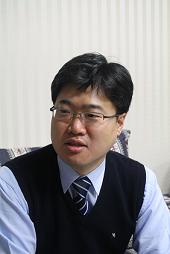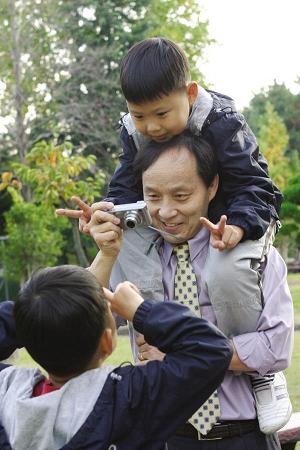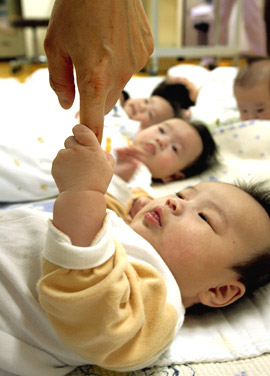Adoption, making families complete
Not flesh of my flesh
Nor bone of my bone,
But still miraculously my own.
Never forget for a single minute,
You didn't grow under my heart,
But in it.
-Fleur Conkling Heyliger
The Current Trend in Korean Adoption

In Korea, adoption was an unfamiliar concept until recently. Korea has been known as the country of exporting children, with approximately 159,000 children adopted overseas from 1958 to 2006. The antipathy toward adoption and the high rate of overseas adoption in Korea comes fundamentally from its Confucian tradition. “In Korean society, blood ties are very important and strong. Therefore, many people do not perceive adoptive family as normal,” says Kim Byung-su (Social Worker, Holt International Children’s Services). Therefore, it is hard for parents to decide on adoption, and even harder for adopted children to make their way through the hostile eyes of others. Even today, adoption is facing some prejudices from society.
Aside from the biased perception of society, the children also face a legal restriction in their first step toward finding stable lives with a family. In 2007, the government established a quota on the number of children adopted by foreign countries. At the same time, many Korean babies are born and left without a family to nurture them. In 2006, there were 1,899 babies adopted overseas, whereas in 2007, the number decreased sharply to 1,364 and it further declined to 1,125 in 2009. This is a 40% decrease in the number of adopted children overseas in three years time. To make matters worse, the national adoption has not increased much. There were 1,332 children adopted nationally in 2006, but the number decreased to 1,314 in 2009. Therefore, the babies who have not been chosen have to be taken to the shelter houses instead of the warm arms of a family.
A child’s journey to find a family is a long and difficult one, yet his hardship does not end there. In 2006, 762 children adopted in Korea were abandoned by their adopted parents, who gave up taking care of them. In Korea, to relinquish an adopted child, the parents only need to notify the district office. An agreement from both parents is the only thing needed, which makes giving up an adopted child very easy. “The problem is that in Korea, abandoning an adopted child does not require legal procedures, unlike in foreign countries where a legal trial is necessary to relinquish an adopted child,” says Cho Min-hye (Director, Mission to Promote Adoption in Korea (MPAK)).
My two sons, pieces for a wholesome family

When I first saw my sons Dae-han and Min-guk, I could see that the little but whole beings were somewhat afraid of the stranger standing in front of them. I tried to spread my arms to hug them, but my arms were stiff, because still at this moment, doubts were coming into my mind. “Will I be able to raise these children well?”, “I already have two daughters, how will this adoption affect them?” “Will this decision bring happiness to my family?” It was a short moment, yet so many doubts and worries flashed through my mind. I held them in my arms somewhat awkwardly and tried to see them more up-close. Then I saw their eyes. The clear, pure eyes that longed for someone, they were so dependent. It was only I who could change their lives for the better, and they needed me. This moment, it was more than just meets the eye; it was a promise for eternity.
After they became members of the family, much had changed. There were new words added to the new life: Tiredness, noise, disturbance of sleep were some, but much more than these, there were laughter, joy, comfort, and happiness. All the worries I had at first vanished, along with the doubts of whether I could accept them as my own children. They are no different from the two daughters I am tied to by blood though I am tied to my two sons by love. With them, the family was completed. It is a home, a sweet home.
The dilemma of open adoption and closed adoption
Mr. Hwang’s family has become a wholesome and joyous family by adoption. However, the family had to go through the transition period that all adoptive families undergo. It is the dilemma of whether to be open about their adoption to the adopted child and the people around them, or to keep it a secret from people. Although there are increased numbers of families who take on open adoption compared to the past, there are still many more families who choose closed adoption. The perception within the society is still distorted. Although Mr. Hwang’s family chose open adoption, he confesses that he needed much courage. “When I first decided to be open about adoption to my children and people around me, I was afraid of the prejudice my two sons would face in society,” says Hwang. It is true, that they will face some difficulties in life and there are problems that will follow when the children come to know that they are adopted. However, there are more problems following closed adoption than open adoption.
One problem of closed adoption is that it can be fatal to the well-being of the family. “When parents choose closed adoption, they would have to constantly deceive their children. The stress that comes from the lies and the fear of the child knowing adoption would be destructive to the family,” says Han Yeon-hee (President, MPAK). Moreover, such secrets are destined not to last forever, and when the uncomfortable truth is revealed, another problem emerges. “There are many parents who keep adoption a secret from their children, however, most of the time it is eventually disclosed. When children discover the truth about their birth parents, they face emotional chaos. They do not know how to tell their parents that they know the truth, and they would think that adoption is something negative, something to hide,” says Park Kyung-ja (Prof., Dept. of Child & Family studies).
Besides the problems of closed adoption, there are problems with lying in open adoption as well; the children who know about their adoption will feel depressed and angry sometimes. “When children find out about their adoption, it will shake their answer to the fundamental question of ‘Who am I?,’ and the feeling of abandonment can make children confused,” says Park.
Yes, the children will undergo an emotional identity crisis by open adoption, and the decision to be open about their adoption should be decided by the parents. However, they must also take the positive sides of open adoption into consideration. Being open about adoption and being living examples to prove the happiness from adoption will enable society to become familiar with adoption. “One of the reasons why I decided on open adoption is that I wanted to change the negative view of adoption in the society by showing a harmonious and wholesome family. Hopefully, through this, adoption will increase,” says Hwang. Moreover, by being open-minded about their adoption, the children can deal better with the identity crisis they will face. “The reason why I chose to be open about my adoption is that I wanted to be honest to my child and share his emotions, feel sad when he is and happy when he is; the truthful conversations has made my father to son relationship more intimate,” says Han.
For love to grow

Moreover, there should be a change in adoption procedures. Adoption process right now is focused on parents rather than children; however, it should be more focused on the welfare of children. “During the adoption process, parents are the choosers; they require certain gender, blood type and looks. However, if parents embrace the child for whom they are, and for the happiness of the family, adoption will bring joy for both parents and the child,” says Kim. “For this, the parents should realize an important fact that it’s the environment?not the genes?that help children grow to become righteous adults, ,” says Park.
Other than the perceptional changes in society, institutional changes are needed for better adoption procedures and for the welfare of the children. The quota on overseas adoption should be reconsidered, for the future of children themselves. Children are being sacrificed for the greed of adults, trying to eradicate the notion of “baby exporting” country. However, the happy life of a person is more important than the negative image of a country. In the end, when children cannot find a family, they are sent to orphanages. There, they would be taken care of, but when they graduate high school, they can no longer stay at the orphanages. Out in the harsh world, it is questionable if they can live an honest, respectable life. “Regardless of the countries they are being sent to, what children need most is the care of family. There are many incidents where overseas adopted children become very successful. For children, finding warm families is more important,” says Kim.
For love to strengthen, to make society a better place for the abandoned children, we must not abandon our care andlove for them. Along with the right systematical changes, we need to protect children from becoming victims of prejudices from society and government
* * *
There is a baby crying in bed, he cries, looking for the mother. However, the mother does not appear, as she has abandoned the baby. The baby cries for the care and love of family, but oftentimes, the cry is not answered. They are the innocent ones who suffer; their first relationship in the world has failed. However, we cannot neglect them to carry the sorrow for the rest of their lives. With love, they will be able to keep the hope and light in their eyes. We must realize that although blood might be thicker than water, love is thicker than blood.

